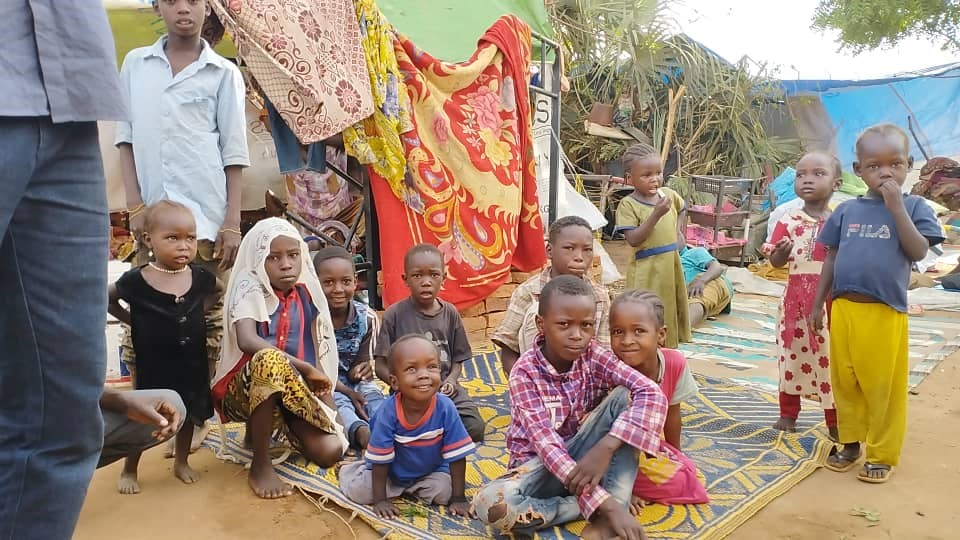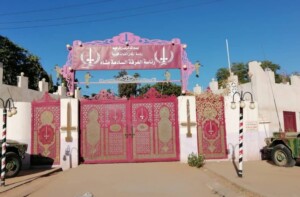CSOs condemn ‘historical apathy’ in Sudan amidst rise in ‘ethnically-motivated’ violence

Children displaced by the violence in El Geneina in makeshift shelters (Photo: RD)
More than 30 Sudanese and international civil society organisations issued a joint statement yesterday, to condemn the surge in ‘ethnic hatred’ and the extrajudicial killings on ethnic grounds during the ongoing war in Sudan between the Sudan Armed Forces (SAF) and the paramilitary Rapid Support Forces (RSF).
The statement, titled ‘Ethnically motivated extra-judicial executions in Sudan’, published by the Darfur Network for Human Rights (DNHR) and co-signed by 34 Sudanese and international civil rights organisations, draws attention to “the growing hate crimes and killings on ethnic and tribal grounds in Sudan”, particularly against those hailing from the Darfur and Kordofan regions.
The organisations express shock at circulating video footage of “tens of young men from Kordofan and Darfur that were paraded on the streets of Wad Madani”, the capital of El Gezira, before being publicly executed on December 16 by security forces. The statement calls this incident “the tip of the iceberg”.
“These victims are unarmed civilians, some of them lived in the area for years and are not known to be politically active. Their only crime is that they hail from Darfur and Kordofan and belong to tribes such as the Rizeigat, Misseriya, Fur, Zaghawa, Masalit, and a host of smaller tribes falsely accused by the army of being members of the RSF”, the civil groups lament.
‘Historical apathy of the Sudanese authorities towards these criminal acts is a flagrant violation of the country’s obligations under the International Convention on the Elimination of All Forms of Racial Discrimination to which Sudan acceded on 21 March 1977…’ – DNHR
The organisations refer to a rise in calls for “ethnic hatred” and “racially-motivated killings” over the last three years, as well as credible reports of arbitrary detentions and summary executions of hundreds of young men from Darfur and Kordofan by Military Intelligence and the General Intelligence Service (GIS)*. Such frequent arrests and execution campaigns are particularly severe and violent in major cities in River Nile state and Northern State such as Dongola, Shendi, and Atbara, in addition to Port Sudan, Kassala, and Kosti.
The CSOs are particularly concerned by the lack of official response to the ethnically motivated killings, adding that the “historical apathy of the Sudanese authorities towards these criminal acts is a flagrant violation of the country’s obligations under the International Convention on the Elimination of All Forms of Racial Discrimination to which Sudan acceded on 21 March 1977”.
The signatories, which include Sudan’s Emergency Lawyers and the Darfur Bar Association, issue a stark reminder that “Sudan is a multi-ethnic, multi-cultural and multi-religious country and any unwarranted calls for ethnic hatred and intolerance will foster racial and tribal bipolarisation and complicate the ongoing armed conflict at the detriment of national unity.”
The statement presented the following two recommendations to tackle the issue:
“The warring parties in Sudan should respect their obligations under international humanitarian law, especially regarding the treatment of civilians and that the Sudan military intelligence and the General Intelligence Service put an immediate halt to their policy of ethnically motivated extra-judicial killing and ill-treatment of innocent civilians. All individuals that ordered the commission of such crimes on ethnic or tribal motives should be held accountable and the victims and their families should be compensated.
Furthermore, “Any peace deal in Sudan should envisage a national campaign on tolerance and coexistence as part of a multidisciplinary National Plan of Action to Combat Racism and Discrimination in order to fulfil its obligations under the Durban Declaration and Programme of Action, which were agreed upon at the 2001 World Conference against Racism, Racial Discrimination, Xenophobia and Related Intolerance. Measures entailed in such a Plan of Action should effectively address the historical and the ongoing injustices and heal the wounds of the past”.
* The predecessor of the General Intelligence Service (GIS), the National Intelligence and Security Service (NISS), was one of the most infamous and feared organs of the Omar Al Bashir regime, that acted ruthlessly against any political dissent. The NISS was officially disbanded in July 2019 following the ousting of President Al Bashir three months earlier. Several articles of the National Security Act of 2010 were amended, to restructure the intelligence service and adjust its competences. The GIS is officially no longer authorised to detain people or carry out search operations. However, after the joint SAF-RSF coup d’etat in October 2021, reports of violent suppression of freedoms that characterised the 30-year Al Bashir regime returned in all levels of society. Military Intelligence and GIS were given free powers of detention again.











 and then
and then